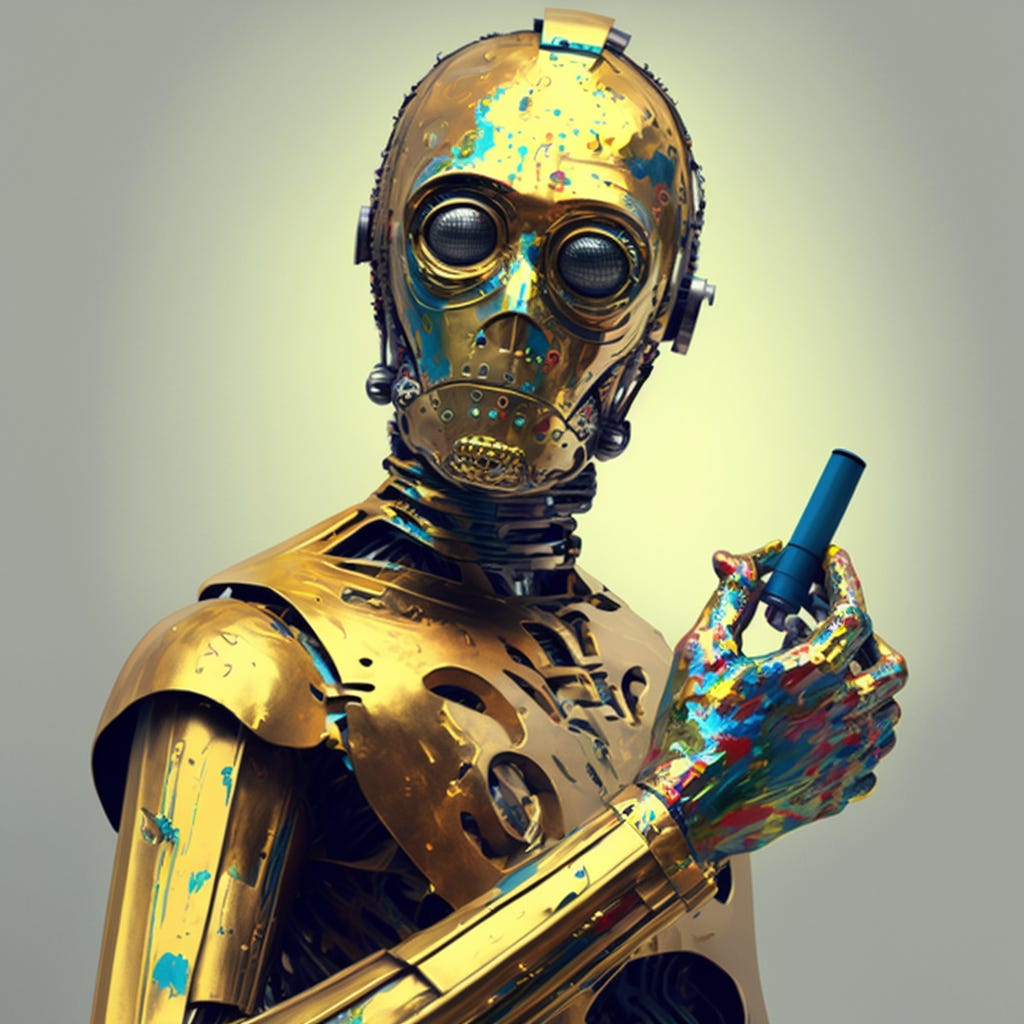Why Don't AI Art Generators Feel Conscious?
Words vs. Images: What Creates the Illusion of Consciousness?
Why do many people anthropomorphize text-based AIs like ChatGPT, but not image generation AIs like Midjourney?
John Oliver summoning an image of him marrying a cabbage elicit laughs, but Kevin Roose goading AI into sinister shadow-self role-play provokes visions of Hal9000. What’s the difference?
It seems an AI that talks like a human registers as more conscious than one that creates art like a human. People love Stable Diffusion but they don't fall in love with it, as some claim to have with text-based AI products like Replika.
This contradiction inspired me to write a Twitter thread that got widely shared (and hotly debated):
I believe the root of this double standard is how we perceive and define consciousness. When I say "consciousness" I mean something like "the experience of being alive" or "the feeling of awareness." (Maybe "awarable" is a better word)
What is consciousness? We may never fully know, but we recognize it when we see it, and when we don’t. Or at least we did. Suddenly, LLMs like ChatGPT are passing the Turing test: the ability for a machine to appear conscious to a human by answering questions.
The test’s emphasis on answers and language tells us something interesting about how we think about and define consciousness. Perhaps we treat words as proof of consciousness because that’s how human consciousness most often manifests—almost everyone can speak and write—but at best, words are a blurry JPEG of our thoughts. As Theodore Dreiser put it "words are but the vague shadows of the volumes we mean." Some words are useful, but all words are wrong.
LEFT BRAIN BIAS
Why doesn't the Turing test include artistic output too? The root of this cognitive dissonance is in "left-brain discrimination." Humans favor the analytical and verbal thinking of the left hemisphere over the intuitive and visual thinking of the right hemisphere.
As an example: Almost every sci-fi writer predicted that AI would be left-brained instead of right-brained, but (so far) it seems to be the opposite—AI can compose beautiful works of poetry or funny stories but has trouble with logic problems.
The neuroscience tells a different story than our assumptions. In the 1960s, Roger Sperry conducted experiments with split-brain patients—people with a severed corpus callosum (the tissue connecting the brain's two hemispheres). When shown a word in their left visual field (controlled by the right hemisphere), participants were unable to name or remember the object, but they were able to draw a picture of it with their left hand. This experiment suggested that the left side of the brain is responsible for language, while the right side can recognize words but not say them. It challenged the idea that consciousness is tied to language.
These ideas will be no surprise to anyone with experience in psychedelics or advanced meditation. Mystics have claimed for centuries that we are not our thoughts. According to them the word-generator in our head is just that—a separate system that we can live without. For most of us, words are linked to our sense of self—we identify with the voice in our heads. But how necessary is language to consciousness? If someone can only think in pictures or only express themselves through interpretive dance, are they any less aware, any less human?
Another related double standard is how many complaints there are about image models stealing from artists compared to complaints about language models stealing from writers. Is it because we steal every time we open our mouths? Compared to visual art, language is a clichéd copypasta. Maybe we don't want to admit how un-unique we really are.
For example, I stole every word I wrote in this article (except "awarable"). Even worse, parts of this article were written by ChatGPT and other parts by my wife Martha, and all of it was recycled through artificial and natural minds until even I don't know (or care) which intelligence placed which word where. (Except for that last sentence. That's a banger. Let's all agree I wrote that one)
I do know that my tweets struck a nerve. They demonstrated another LLM advantage—words trigger us! With just a few words I made people think. I made people angry. More than one person mocked me for believing that Midjourney was conscious. For the record, I don't. I also don't think ChatGPT is conscious. I'm not even sure AI can be conscious. (There are many smart thinkers on both sides of the debate)
My point is that looks—and words—can be deceiving. If an AI does become conscious, it might not be able to tell us. It might have to draw us a picture instead.





![[optimize output image] [optimize output image]](https://substackcdn.com/image/fetch/$s_!Mgt6!,w_1456,c_limit,f_auto,q_auto:good,fl_lossy/https%3A%2F%2Fsubstack-post-media.s3.amazonaws.com%2Fpublic%2Fimages%2Fffe36f03-b22a-4b35-913a-da253d730442_720x450.gif)


